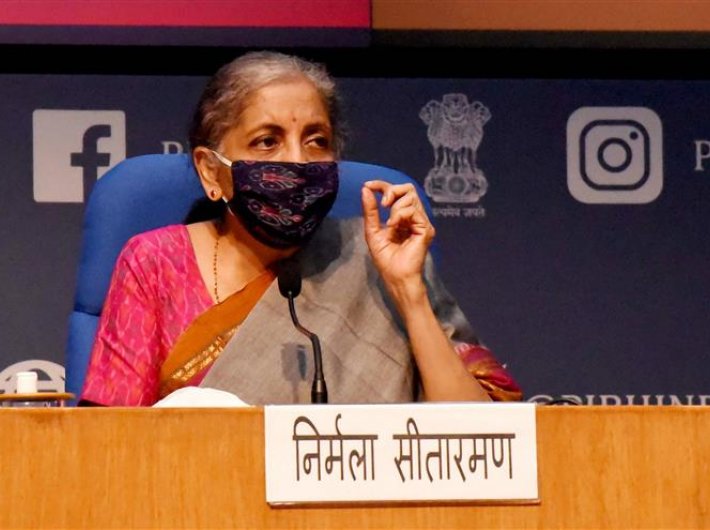This innovative development model can help the nation use resources optimally while managing rapid urbanisation, climate change, global pandemic and other challenges
The Union Budget 2022-23 will be presented on February 1, amidst the third COVID-19 wave. After the two waves of the pandemic, the GDP for FY 21 contracted by 7.3% but following a V-shaped recovery, the FY 22 growth is expected to be 9.22%. Maintaining the trajectory of this growth, while combatting the third and any further COVID-19 waves, makes this budget extremely important. Hence, in this article, we outline how harnessing the power of circular economy (CE) in this year’s budget could help India attain high as well as equitable economic growth.
A circular economy refers to a restorative or regenerative economy. It emphasises designing a model of production and consumption which eliminates waste through reusing, refurbishing and recycling the existing materials. This economic path could yield benefits of around Rs 40 lakh crore or around 30% of the current GDP value by 2050. CE also holds the potential to lower the negative externalities, such as the greenhouse gas (GHG) emissions by 44% in 2050, helping India achieve the climate action targets set in the Paris Agreement. Against the backdrop of advantages of growth, employment, and India’s achievement of climate change goals, we discuss how this year’s budget could utilise resources to promote renewable energy, provide incentives for green technologies and the water, sanitation and hygiene (WASH) sector. These measures will accelerate the shift to CE.
One of the most important allocations to maintain the momentum in renewable energy would be towards the Pradhan Mantri Kisan Urja Suraksha evem Utthan Mahabhiyan (PM KUSUM) scheme. This would continue the efforts to decentralise as well as grant universal access to renewable energy (like the rooftop solar panels). In a similar vein, there should be incentives that bolster the manufacture of solar equipment in India. India’s domestic demand is largely met by imports. A study by TERI estimates that if this import substitution happens, then India could gain Rs 2,94,000 crore through domestic manufacture of solar equipment.
Budget 2021-22 also attempted to tackle the closing of old and inefficient thermal power plants. This budget too should continue to incentivise such disinvestment. However, unlike the previous budget, this budget could extend to announcing provisions to discourage carbon dioxide emissions from these industries. Another academically backed solution is to eliminate or refrain from introducing new subsidies for fossil fuels as it encourages the consumer to waste energy and adds to the emissions. Lastly, incentives could be announced for the voluntary disclosure of energy usage and carbon emissions for the oil and gas sector.
Coming to the new technologies that could accelerate the realisation of CE, we suggest that the budget, unlike last year, should provide direct incentives to electric vehicles (EVs). The budget should support a capital subsidy to promote EVs, both private and public. Provisions should also be made to continue supporting the voluntary vehicle scrapping policy as well as streamline incentives for the industries that can recycle and refurbish these parts and use them for further product manufacturing. The budget could also introduce a GST rebate on the purchase of a new EV vehicle in exchange for scraping the older vehicle. India is the fourth green building maker in the world, and yet systematic incentives for these buildings were not mentioned under Budget 2021-22. A cue could be taken from the Maharashtra government’s green building policy which provides property tax rebates and green certification.
The budget, with respect to the WASH sector, announced an outlay of Rs 2.87 lakh crores to the Jal Jeevan Mission (JJM) that aims for universal water supply and liquid waste management; an outlay of Rs 1.41 lakh crores for Urban Swachh Bharat Mission 2.0 for the next five years to tackle “faecal sludge management, wastewater treatment, single-use plastic reduction, and reduction in air pollution by effectively managing waste from construction and demolition activities”. Research has shown that regular handwashing and safe solid and liquid waste management (SLWM) is essential to contain the spread of many diseases.
Given that the pandemic has highlighted the magnitude of negative externalities from the unsafe sanitary practices, we believe that the continued allocation of resources to the WASH sector is of paramount importance to manage the upcoming waves of the pandemic. However, a supplementary provision in the budget could be made to monitor the SLWM outputs. For instance, the SBM 2.0 dashboard currently displays only the number of villages that are open defecation free and have SLWM (i.e., ODF+), but to attain the goal of CE from these initiatives it is also important to track the pollutant load in soil, land, water resources (both surface and groundwater). Transparent tracking of these outputs will help the policymakers prioritise the areas that need urgent management in pollution levels.
A pressing need for India is to build a development model that uses resources optimally while managing rapid urbanisation, climate change, a global pandemic, and other issues plaguing the economy. To combat these, this budget must acknowledge the role of CE and aid India to move towards a circular economy model.
Payal Seth is a PhD Scholar at Bennett University. Palakh Jain is an associate professor at Bennett University.
